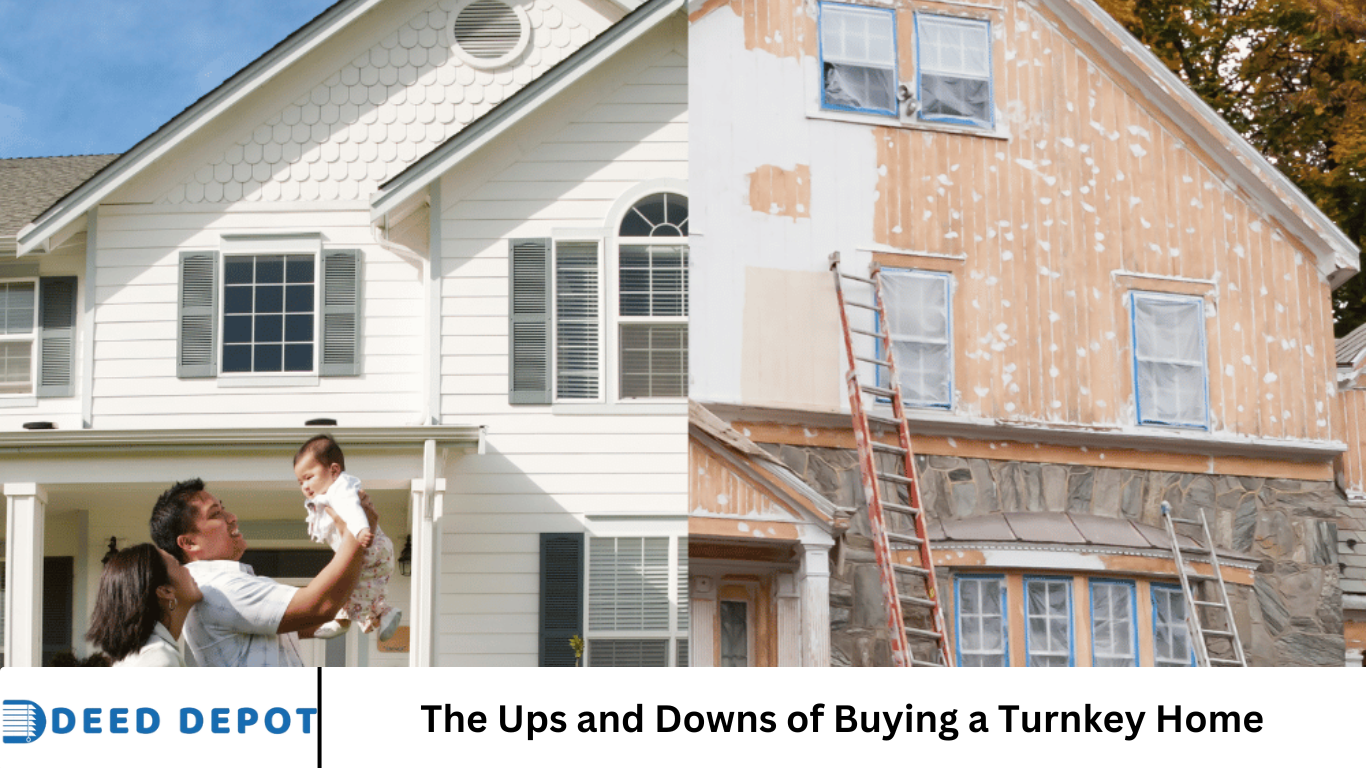When it comes to real estate investment or homeownership, buying a turnkey home can seem like an attractive option. These properties are move-in ready, often recently renovated, and require little to no work before occupancy.
Whether you’re a first-time buyer, a busy professional, or an investor looking for a low-maintenance asset, turnkey homes offer a convenient alternative to traditional real estate purchases. However, like any investment, they come with their own set of pros and cons.
In this comprehensive guide, we will explore the ups and downs of buying a turnkey home to help you make an informed decision. Whether you’re thinking about using it as a rental property or settling into it yourself, understanding what turnkey homes truly entail is essential.
More Read: Understanding Capital Gains Tax on Home Sales: How Real Estate Taxes Work
What Is a Turnkey Home?
A turnkey home is a property that is completely renovated and ready for immediate use. The term “turnkey” comes from the idea that all you need to do is turn the key in the front door and move in. These homes are typically offered by real estate companies or investors who specialize in buying, renovating, and reselling homes.
Turnkey homes may include:
- Updated kitchens and bathrooms
- New flooring and paint
- Modern appliances
- HVAC, plumbing, and electrical systems in good condition
- Compliance with local building codes
They are especially popular among out-of-town investors and busy individuals who don’t have the time or resources to manage extensive renovations.
The Ups of Buying a Turnkey Home
1. Move-In Ready Convenience
One of the most significant advantages of a turnkey home is its immediate readiness. You can skip the hassle of renovations, construction delays, or dealing with contractors. This is particularly beneficial for families or professionals who need a home quickly.
2. Time and Effort Savings
Turnkey properties save time and effort, particularly for buyers who may lack experience with renovations. Instead of managing multiple tasks and timelines, buyers can focus on settling in or leasing the property right away.
3. Attractive for Investors
For real estate investors, turnkey properties can be a fast track to rental income. Many turnkey homes are marketed with tenants already in place, offering immediate cash flow. Some companies even offer property management services as part of the package.
4. Financing Advantages
Lenders often view turnkey homes as lower-risk investments compared to fixer-uppers. This can make it easier to secure financing with favorable terms, especially if the property is already generating income.
5. Predictable Costs
With a turnkey home, costs are more predictable because the major renovations are already completed. This reduces the likelihood of unexpected expenses that can arise from hidden issues in older, unrenovated properties.
The Downs of Buying a Turnkey Home
1. Higher Upfront Costs
Turnkey properties often come with a premium price tag due to the renovations and updates already performed. You may end up paying significantly more than you would for a similar home that needs work, which could limit your profit margins as an investor.
2. Limited Customization
Since the work is already done, you don’t get to make many design or layout choices. This can be a downside for homeowners who want a property that reflects their personal tastes.
3. Potentially Superficial Renovations
Not all renovations are created equal. Some turnkey homes may have cosmetic updates that hide deeper problems. Always conduct a thorough inspection to ensure the quality of work meets your standards.
4. Less Room for Appreciation
Because the home is already updated, there’s less opportunity to add value through renovations. This can make it more difficult to achieve significant appreciation in a short period, particularly in slower markets.
5. Dependence on Turnkey Providers
Many buyers rely heavily on the reputation and integrity of the turnkey company. If the company cuts corners or uses subpar materials, the buyer may face issues down the road.
Tips for Buying a Turnkey Home
1. Do Your Due Diligence
Research the company or seller providing the turnkey home. Look at reviews, past projects, and ask for references. Don’t be afraid to dig into the details.
2. Get a Professional Inspection
Even if the home looks perfect, always get a professional home inspection. This will uncover any hidden issues that could become costly in the future.
3. Evaluate the Local Market
Make sure the home is in a desirable location with strong rental or resale potential. Proximity to schools, public transportation, and amenities can significantly impact property value.
4. Understand the Financials
If you’re buying as an investment, look at the numbers closely. Consider cash flow, expenses, taxes, and potential appreciation. Ensure the property aligns with your financial goals.
5. Consider Property Management Options
If you’re an out-of-state investor or don’t want to handle day-to-day issues, look into property management services. Some turnkey providers offer these services, but it’s essential to vet them independently.
Is a Turnkey Home Right for You?
Whether a turnkey home is a good fit depends on your individual needs, goals, and resources. Ask yourself the following questions:
- Are you looking for a hassle-free move-in experience?
- Do you want to start earning rental income immediately?
- Are you okay with limited control over design and layout?
- Can you afford the premium pricing?
If you answer yes to most of these questions, a turnkey home could be an excellent choice.
Frequently Asked Question
Are turnkey homes a good investment?
Yes, especially for investors seeking immediate rental income without the hassle of renovations. However, success depends on the quality of the property and market conditions.
Can I negotiate the price of a turnkey home?
Yes, but sellers may be less flexible since the property is newly renovated. A comparative market analysis can help determine a fair offer.
Do turnkey homes come with warranties?
Some do, especially if offered by professional turnkey providers. Always ask about warranties on appliances, systems, or renovation work.
How do I find a reputable turnkey provider?
Research online reviews, ask for references, and check their previous work. A strong track record is key to a successful purchase.
Are there turnkey homes in albuying a turnkey property?
Hidden risks include poor-quality renovations, undisclosed maintenance issues, or overpaying due to inflated renovation costs. Always get an independent inspection and appraisal.
Can I still add value to a turnkey home?
Yes, but the opportunities may be limited compared to fixer-uppers. You can still enhance value through strategic improvements like landscaping, energy-efficient upgrades, or converting unused spaces.
Conclusion
Turnkey homes offer a compelling option for those looking to avoid the complexities of renovation and maintenance. They provide a fast, convenient path to homeownership or investment, especially in competitive markets where speed is an asset. However, it’s essential to approach these properties with the same scrutiny and diligence you would apply to any major financial decision. By understanding the pros and cons of buying a turnkey home, you can make a choice that aligns with your lifestyle, financial goals, and long-term plans. Whether you’re investing in your future or seeking a place to call home, knowing what to expect from a turnkey property is the first step toward a successful real estate experience.


